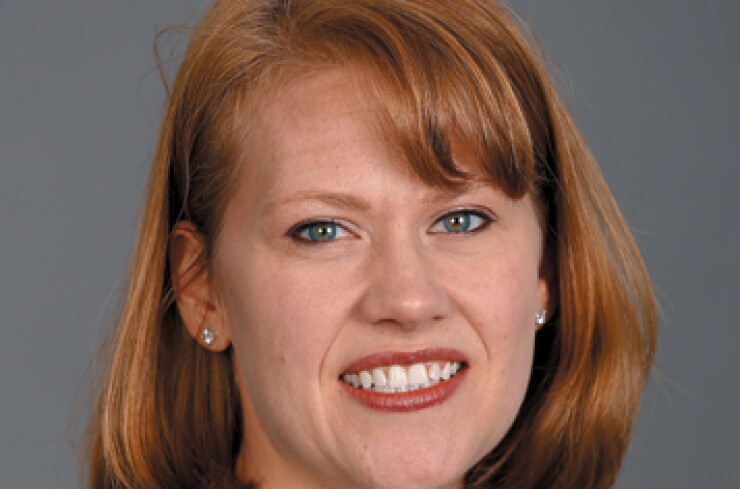CHICAGO – While Illinois J.B. Pritzker’s election as Illinois signals a likely end to budget gridlock, municipal investors are less certain of the prospects for curing the state’s deep fiscal ailments.
Pritzker, a Democrat who denied incumbent Bruce Rauner a second term on Tuesday, will inherit a $7 billion-plus bill backlog, $129 billion of unfunded pension liabilities, and a $1.2 billion structural deficit. There’s little room for fiscal missteps with two ratings only a notch above speculative grade.

His victory also aligns the governor's office with Democratic majorities in the state legislature and ends lawmakers' toxic relationship with Rauner.
“Certainly the optimistic view and hopeful one from many in us in the analyst community is that this means the end of gridlock so we won’t see these down-to-wire and over-the-wire partisan battles where credit quality is often the victim,” said Paul Mansour, head of municipal credit research at Conning.
“While there are no guarantees, a Pritzker win almost certainly means a budget stand-off like that which occurred under Gov. Rauner will not be seen. That alone is rightly enough to justify a view of calmer waters for the state,” said John Humphrey, head of credit research at Gurtin Municipal Bond Management.
“I think the baseline expectation is that the governor and General Assembly will do whatever necessary to avoid another budget impasse and there will be an emphasis on constraining any further growth in the backlog of accounts payables,” said Molly Shellhorn, senior research analyst on Nuveen Asset Management’s municipal fixed-income team.
Pritzker offered only sketchy ideas during the campaign about how he would tackle the state’s most pressing fiscal strains while also funding promised billions in new spending on education and infrastructure. He largely steered clear of those touchy topics in his acceptance speech.
“We will bring fairness to our tax system and tackle the fiscal challenges of our state and we will become the leading protector of workers’ rights and civil rights and human rights in the nation,” he said. Pritzker wants to pursue a constitutional amendment to shift to a graduated income tax from the current flat tax rate.
“Certainly he’s concerned about the pension costs and bill backlog, however I get the idea he has other priorities ahead of those,” Mansour said.
“Any sort of increased labor costs or increased taxes or other measures that weaken the state’s already poor business environment would cause me concern,” he said.
“There still remains the grim reality of a large backlog of unpaid bills and the relentless growth in pension contributions is quite real, all occurring during a period of relative economic calm. At best, I think Illinois slogs through the next decade,” Humphrey said.
“Given that we know very little about his plans for achieving a graduated income tax or pension reform, I think investors will be anxious to hear detailed plans,” Shellhorn said. “Investors are likely hopeful any attempt to pursue a constitutional amendment to change the flat income tax requirement will be paired with a second amendment proposal aimed at addressing pension reform. Putting both up for consideration would bolster confidence.”
Pension reform would be contested by labor, strong supporters of Pritzker and Democrats.
The election did not immediately impact secondary general obligation trading spreads that had hit a high of more than 300 basis points to the Municipal Market Data top benchmark at the height of the impasse in mid-2017. While fluctuating over 2018, the 10-year currently is at 185 bp.
“The underlying problems of the ‘Prairie State’ have not changed and the market for these bonds did not demonstrably change,” said Dan Berger, senior market strategist at Municipal Market Data.
WAITING AND WATCHING
On Wednesday, Pritzker named a transition team that includes former GOP Gov. Jim Edgar, former state Comptroller Dan Hynes and Chicago mayoral advisor Michael Sacks, architect of a proposed $10 billion city pension bond proposal. Hynes will lead a
“If the new administration were smart, they’d put together a list of priorities and match them up with the revenues they expect and have some candid meetings with the rating agencies to illustrate their commitment toward credit quality,” Mansour said.

A fiscal 2020 budget is due in February but the state may have red ink to close from the $38.5 billion fiscal 2019 plan. The size of the gap will depend on whether Illinois must come up with $400 million for overdue raises and whether $400 million in savings are realized from bond-financed pension buyouts and $250 million from the long-stalled sale of the state’s downtown Chicago headquarters.
The 2017 income tax hike approved as part of the fiscal 2018 budget after a group of Republicans broke ranks with Rauner and the roughly $4.5 billion it generates has eased, but not eliminated, budgetary strains.
“We’ll be interested to see how he chooses to address the fiscal 2019 budget gap he’ll immediately face, and if he’ll pursue the plan to issue $1 billion in new general obligation debt to fund a pension buyout before the end of the fiscal year,” Shellhorn said.
Pritzker provided a further glimpse into his priorities Wednesday. He backed off from plans to possibly raise the income tax rate and offer tax breaks for lower and middle income payers as an interim solution until a constitutional amendment on a graduated tax is placed on the ballot in 2020.
“That’s not something I'm looking at currently,” he said in an interview on WTTW’s Chicago Tonight program. He will negotiate the tax structure with lawmakers. Tax hikes pose a balancing act because he doesn’t want to damage the state’s economic prospects, he said.
The hurdles to getting an amendment on the ballot eased with Tuesday’s election as Democrats regained a three-fifths supermajority in the House and held on to their Senate supermajority. Supermajority votes are needed to place a measure on the ballot. The GOP opposes the idea, and It’s unclear if all Democrats would be on board.
A capital bill is a priority Pritzker wants to tackle “nearly right away” along with a balanced budget. "It's been a long time since we put money into our roads and bridges and waterways,” he said.
The state’s $31 billion 2009 package is winding down and revenue sources intended to fund it have fallen short, forcing the state to dip into its general fund to cover borrowing.
New potential revenue sources for the budget and infrastructure include legalizing recreational marijuana, which some say could generate an estimated $700 million to $1 billion, and expanding gambling, including a launch of sports betting. Estimates vary on the latter. A gas tax hike remains on the table.
“We are going to look at everything because balancing the budget is critically important if we are going to address the real challenge we have,” Pritzker said.

Pritzker has said pensions are a promise that the state must honor. He opposes proposals to shift the state’s funding of teacher pensions to local schools but has suggested that the state consider funneling more money into the system upfront to level out the escalating 50-year ramp put in place by the state in 1995 to reach a 90% funded ratio. He told Crain’s Chicago Business he’s “looking seriously” at such a proposal that relies on issuing pension bonds to raise the infusion of cash. The backer of the idea from the CTBA sits on his budget working committee.
Local governments, too, are clamoring for the state to provide a fix. The state’s more than 600 local public safety pension funds carried nearly $10 billion of unfunded liabilities and if they fall short of actuarial contributions they face a state revenue intercept.
The collective funded ratios of all Illinois public pension funds falls under 50% with the collective liabilities of public pension funds statewide at $185.2 billion in fiscal 2016 compared to $168.2 billion in fiscal 2015. That figure includes the local public safety funds, the state’s five fund retirement system, Chicago and its sister agencies, and Cook County.
It’s unclear whether a constitutional amendment push will pick up steam given labor's opposition. Proponents want to put a question to voters that eases the 1970 pension clause prohibiting any impairment or diminishment of benefits. Labor warns any change imposed on accrued benefits or future ones owed to current employees would be challenged as a violation of the state's contract with its employees.
Voters in Arizona, which has similar language in place, in 2016 amended its constitution allowing lawmakers to enact reforms to public safety pensions as part of a negotiated agreement that has not been challenged. Voters there on Tuesday approved an amendment allowing lawmakers to modify pensions for elected officials and correctional officers.
DOWNSTREAM RELATIONSHIPS
“A Pritzker win is probably be good for schools and municipalities because the threat of a property tax freeze has receded, as does the threat of pushing more pension sharing costs down on them,” Humphrey said.
Sweeping changes lay ahead for state-related issuing authorities. The governor holds sway over the top leadership and boards of bond issuing agencies, including the Illinois Finance Authority and the Illinois State Toll Highway Authority.
The governor shares input with Chicago on Metropolitan Pier and Exposition Authority and Illinois Sports Facilities Authority leadership and also holds sway on key appointments to the Regional Transportation Authority of Illinois board, along with Chicago and suburban governments.
The relationship between the governor and Chicago won’t be known until February or April as Mayor Rahm Emanuel is not seeking a third term. If no candidate wins a majority in February, the top two vote-getters square off in an April runoff.
Emanuel said Wednesday he will pursue a capital budget in his remaining months. “I will continue to push early on for a major investment in transportation dollars” given their importance to the local economy, he said during a news conference.
Pritzker, like Rauner, never held political office before being elected governor. His fellow Democrats control the General Assembly, but it's unknown how he will get on with longtime House Speaker Michael Madigan, D-Chicago, who was the primary target of Rauner’s attacks. While the two may enjoy a more congenial relationship, Madigan, speaker for all but two years since 1983, will be going on his seventh governor and had chilly relationships with two Democratic governors.
Illinois revenues are a bright spot. General fund revenues are up $595 million through October from a year ago, according to the monthly report from the state’s Commission on Government Forecasting and Accountability. The fiscal year began July 1.
The state’s GOs are rated Baa3 with a stable outlook from Moody's Investors Service. S&P Global Ratings has Illinois at BBB-minus with a stable outlook, and Fitch Ratings has Illinois at BBB with a negative outlook.
“The challenge for the state’s credit quality is that standing still is not sufficient because legacy costs are increasing and in order to pay back the bill backlog you have to actually grow revenue” and that could get more difficult if an economic downturn hits as some are projecting in 2020, Mansour said.





